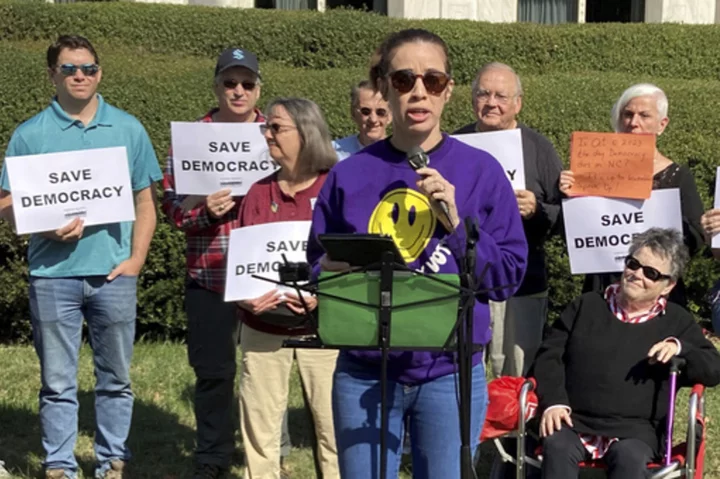RALEIGH, N.C. (AP) — North Carolina Democratic Gov. Roy Cooper sued state Republican lawmakers on Tuesday over a measure that eliminates his authority to pick elections board members, while voting rights groups filed yet another lawsuit challenging provisions of a law that they contend will discourage young people from voting.
Both measures became law last week, when the GOP-controlled General Assembly overrode Cooper's vetoes of them.
The governor's lawsuit, filed in state court against House Speaker Tim Moore and Senate leader Phil Berger, challenges a measure that would transfer his power over the elections board to legislative leaders.
Cooper said the board changes, which would take effect Jan. 1, run counter to the state constitution and state Supreme Court rulings in the 2010s that demand a governor have control over executive agencies to carry out laws. State voters also rejected a 2018 referendum that would have given lawmakers more say over the elections board’s composition.
The governor suggested that GOP legislators advanced the election board bill because Republicans now hold a majority on the court and expect a favorable ruling.
“Both the Courts and the people have rejected this bad idea and the meaning of our Constitution doesn’t change just because the Supreme Court has new Justices," Cooper said in a news release, saying the high court “should accept the clear precedent and the clear voice of the people.”
The state elections board currently comprises five members, with the governor’s party holding three of the seats. The law says the board will grow to eight members — chosen by legislative leaders from both major parties and likely creating a 4-4 split among Democrats and Republicans. Cooper is also challenging portions of the law that tell legislative leaders to pick four election board members for each of the 100 counties.
Republicans argue the appointment shifts will promote bipartisan election administration and consensus. But Cooper and his allies have said the changes are a GOP power grab that will lead to board impasses that could scale back early in-person voting and send outcomes of contested elections to the courts or the General Assembly to settle.
The law also states that if the eight-person board can't agree on hiring an executive director by Jan. 10, then Berger would be tasked with naming one. Republicans have been critical of current Executive Director Karen Brinson Bell for her role in a legal settlement that extended deadlines to receive mail-in absentee ballots in the November 2020 election.
The Associated Press sent an email seeking comment on Cooper's lawsuit to spokespeople for Berger and Moore. Last week, Cooper sued the GOP leaders for another law enacted over his veto that scaled back or eliminated authority from him and future governors to appoint members to several other boards and commissions.
Filed in federal court, the lawsuit submitted Tuesday by Democracy North Carolina, the North Carolina Black Alliance and the League of Women Voters of North Carolina is the latest to fight changes to the process by which someone can both register to vote and cast a ballot during 17 days of early in-person voting. The law also moves up the deadline to turn in completed mail-in absentee votes and fleshes out the role of partisan poll observers.
The three lawsuits that have now been filed in federal court on this omnibus voting law — others were filed last week by the Democratic Party and other groups — are likely to be consolidated and proceed in court as one case, according to a news release from the plaintiffs in Tuesday’s lawsuit.
Tuesday's litigation focuses on same-day registration and how tighter rules will affect citizens age 18 to 25, especially those in college and other transient living spaces. Voters in that age group have composed nearly one-third of those who cast ballots through same-day registration during even-numbered elections since 2016, according to the lawsuit.
The law has said the voter registration of a same-day applicant will be denied if two mailed notices to the registrant's mailing address are returned as undeliverable. The just-enacted legislation would make an applicant ineligible to vote if one such mailed notice is returned as undeliverable. That increases the risk that U.S. Postal Service mishaps will lead to more registration denials, according to the lawsuit.
The new restrictions, including the lack of an appeals process, create new barriers to voting that violate the U.S. Constitution and civil rights law, the lawsuit says.
“Lifting these restrictions is crucial to safeguarding the rights of young and student voters across North Carolina and ensuring a functioning and inclusive democracy for all,” the lawsuit reads.









